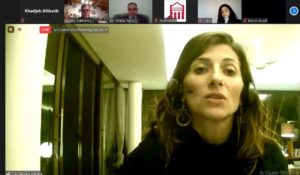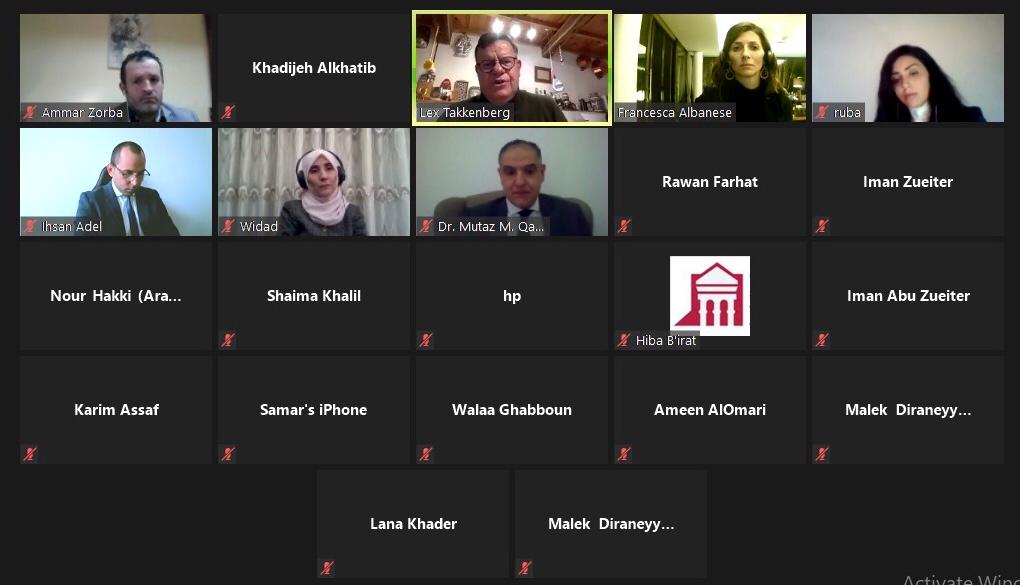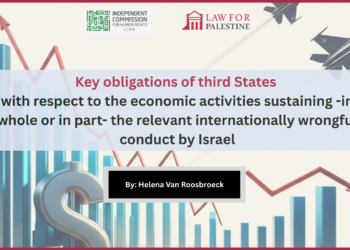United Kingdom-30/04/2021
“Law for Palestine” organized a new panel discussion within the monthly webinars of its “Jurists for Palestine Forum”. The panel discussion, titled “Palestinian Refugees International Protection and Prospects for a Just Solution”, discussed the legal status of Palestinian refugees and the extent of the legal protection that can be provided to them under the international law, from the perspective of “Palestinian Refugees in International Law” book wrote by the webinar’s guests; Dr. Lex Takkenberg and Francesca Albanese.
The panel discussion was held on Friday 09 April 2021 via Zoom and hosted Dr. Lex Takkenberg International Law Specialist, and Former General Counsel and Director of the Legal Affairs department at UNRWA, and Francesca Albanese a Legal Researcher in International Migration, and a Former Legal Officer for both the UNRWA and the UNHCR.
The discussion was moderated by Dr. Mutaz Qafisheh, Assistant Professor of International Law, Former Dean of the Faculty of Law at Hebron University, and Former Human Rights Officer at OHCHR office in Beirut. Dr. Qafisheh started the webinar by providing a quick overview of the book “Palestinian refugees and international law”, regarding the status of Palestinian refugees and the way they differ from other refugees, the protection gap, the impact of the Syrian war on Palestinian refugees in Syria, the possibility to reach a just solution for the Palestinian refugee question, and other issues which were covered during the webinar over a course of an hour and forty minutes.

Besides Dr. Takkenberg and Albanese, 21 researchers and jurists, who are among the members of the forum, participated in the discussion. The webinar was also watched by 400 members of the Jurists for Palestine Forum. The webinar, which was simultaneously translated into Arabic, was broadcasted on several news platforms such as Al Jazeera Mubasher, Quds Network, and the Law for Palestine page on Facebook.
Dr. Takkenberg began the discussion by recalling the first edition of the book in 1998, which was the first ever attempt to study the legal aspects and the special status of Palestinian refugees in international law. According to him, the book was reflecting the optimism which was surrounding the time of Oslo Agreement and the peace negotiations. But this optimism didn’t last long with the failure of the negotiations. The tough reality which followed urged the need for a new updated book that deals with Palestinian refugees from legal, historical and political aspects and analyzes the possible just solutions. This was the book that was published in 2020 together with Francesca Albanese, who spoke to the audience extensively about the most important aspects of the book.

UNRWA symbolizes the political failure in resolving the Palestinian refugee question:
According to Albanese, there is a major misunderstanding regarding Palestinian refugees, as there is an ongoing debate – especially in the West – regarding the status of Palestinian refugees claiming that they are “illegal refugees” and that their right to return is a pure illusion. Albanese emphasized that the failure to find a political solution to their cause is what exacerbated the Palestinian refugee crisis, not the existence of UNRWA itself, as has recently been claimed by several politicians and academics. UNRWA is only a symbol of the political failure in applying the rules of international law.

International Refugee Convention must protect Palestinian refugees:
Albanese has also recalled the dilemma of excluding Palestinian refugees from Article 1D of the 1951 Refugee Convention, which extends the mandate of the convention to all the refugees around the world. At the time of drafting, Palestinian refugees were already protected and served by the UNRWA, and their issue was put on the agenda of the UN Conciliation Commission of Palestine, which was entrusted with the task of finding a just solution for the question of Palestine.
In spite of the Commission’s failure in accomplishing its mission, Palestinian refugees were not clearly re-included under article 1D. This caused Palestinian refugees’ to be deprived from their “right to have rights” as refugees in any area outside the five operating areas of the UNRWA. According to Albanese, this dilemma must end, and Palestinians should be clearly protected by the Convention in any place in the world. In short, UNRWA and UNHCR have to strategically cooperate to provide protection and services to the Palestinian refugees around the globe.
Obtaining citizenship and protection does not affect the right to return:
Another important issue that was raised in the webinar is that in order to be able to seek better protection from the world, Palestinian refugees have to be convinced that accepting international protection and any just solution, including acquiring nationalities of other countries, does not conflict with their inalienable right to return. According to her, this right to return has been guaranteed for Palestinians since 1948 and was clearly reaffirmed by 194 UN resolution. Therefore, it is an absolute right that is not affected by the Palestinians’ acceptance of any just solutions that might improve their welfares until the political conflict is solved.
In conclusion, dr. Takkenberg and Albanese asserted the importance of a comprehensive application of international law to the Palestinian refugee issue. It is necessary to incorporate Palestinians themselves in the process of rethinking durable and short-term solutions to their cause. Dr. Takkenberg highlighted the importance of the 2016 New York Declaration on Refugees and Migrants in reaffirming the rights included in the Refugee Convention which should be provided for all refugees in the world, including the Palestinians, as there is no special framework exclusively for Palestinian Refugees. Thus, a common system of protection has to be created by the UNHCR and the UNRWA in order to protect Palestinian according to the Convention.
The guests added that there is a need to work on local and international levels and incorporate various supporters, the United Nations, the donors, the civil society, the Palestinian leadership, as well as the Palestinian refugees themselves, in order to analyze and test new options for just solution to their question. Dr. Takkenberg and Albanese did not claim it to be an easy journey, rather the opposite. However, looking for durable solutions opens new prospects for international activists to push for better implementation of international law, ultimately leading to progress in the political process necessary to solve the Palestinian refugee crisis.
This webinar comes within the monthly activities of the Jurists for Palestine Forum, affiliated to the Law for Palestine Organization. The Forum is holding online monthly webinars gathering international experts and researchers, students, jurists and people interested in Palestine from different countries of the world to discuss topics and developments related to international law and Palestine, in addition to effectively networking between jurists interested in Palestine from all over the world.
* To attend the next monthly webinars of Jurists for Palestine Forum, you can register via the following link “here“





